FERC-919A User Guide with OMB Info clean draft 10-21-2021
FERC-919A,(Order of 8/2021 in RM16-17-000) Refinements to Policies & Procedures for Market Based Rates for Wholesale Sales of Electric Energy, Capacity & Ancillary Services by Public Utilities
FERC-919A User Guide with OMB Info clean draft 10-21-2021
OMB: 1902-0317
Market-Based Rate
Data Collection
Federal Energy Regulatory Commission
Table of Contents
2. Interaction of MBR Program Filings and MBR Database Submissions - 6 -
B. Changes Resulting from the August 19, 2021 Adopted Revision of Information Collection - 7 -
C. Submission Requirements by Filing Type - 3 -
D. Interim Period Submissions - 4 -
E. Referencing the Asset Appendix - 4 -
F. Referencing the Indicative Screens - 5 -
3. Overview of MBR Portal Submission Process - 7 -
4. Initial Activities: What to Check/Do Before Making Submissions - 8 -
5. Description of the MBR Portal - 10 -
6. Navigating the MBR Portal - 11 -
7. How to Search for, Create, and Use Identifiers - 12 -
A. Searching for an Entity Identifier - 12 -
B. Searching for an Asset Identifier - 14 -
D. Individually Create a New GID - 17 -
E. Creating Multiple GIDs (GID Bulk Upload) - 20 -
F. Requesting an Authentication Key - 23 -
8. How to Compile a List of Generation Assets for a Submission: Asset IDs - 24 -
A. Creating an Asset ID - 24 -
B. Individually Create a New Asset ID - 24 -
C. Creating Multiple Asset IDs (Asset ID Bulk Upload) - 26 -
9. Preparing and Submitting XML - 29 -
11. Overview of API & B2B Access - 37 -
12. Paperwork Reduction Act Materials - 39 -
The market-based rate (MBR) relational database (MBR Database or database) is a modern gateway for the MBR program.1 Information from every Seller2 is required to be submitted to the MBR Database, through extensible markup language (XML) format. This submitted information will be available to the Commission and the public.
Submissions to the MBR Database involve three categories of data: (1) general information regarding the Seller; (2) the Seller’s relationships; and (3) the Seller’s horizontal market power screens. Twelve distinct Tables3 can be submitted to the database, which the Data Dictionary describes in detail. A brief summary of those tables is on the next page.
In addition to using the Data Dictionary as a reference, Submitters should also utilize the lookup tables in the MBR Portal to search for numerical or character identifiers to help complete an XML submission.4
All submissions to, and extractions from, the MBR Database are done via the MBR Portal. This portal allows Submitters5 to submit data to the MBR Database, validate and acquire feedback on their submissions, and search for or extract data from the MBR Database. Generally, any data submitted or amended in the database will be available for search or download immediately after a successful submission.
Data Dictionary Summary
Category |
Table Name |
Description |
General Information |
FilingInformation |
Basic information about a Seller’s CID and contact information |
mbr_authorizations |
Basic MBR Information |
|
mbr_category_status |
Category status in regions where seller has MBR authority |
|
mbr_mitigations |
Markets where seller is mitigated |
|
mbr_self_limitations |
Markets where seller has self-mitigated |
|
mbr_operating_reserves |
Markets authorized to sell operating reserves |
|
Relationships |
entities_to_entities |
Reporting of ultimate upstream affiliates |
entities_to_genassets |
Reporting of generator assets |
|
entities_to_ppa |
Reporting of power purchase agreements |
|
entities_to_vertical_assets |
Reporting of vertical assets |
|
Market Power Screens |
indicative_pss |
Inputs of Pivotal Supplier Screen |
indicative_mss |
This guide describes how to use the MBR Portal for interactions with the MBR Database. It is intended to help Sellers and Submitters navigate the process of submitting data into and extracting data from the database.
An overview of the submission process is found below in the MBR Portal Submission Process section. Please ensure that all entities are properly eRegistered before interacting with the MBR Portal.
Please see the following FERC.gov sites for more information:
If there are questions after reviewing this guide and the above resources, please email [email protected].
As of July 1, 2021, filers must start submitting certain MBR information into the database prior to making filings with the Commission. This section of the user guide discusses submissions that require associated filings and how to reference submissions in these filings.6
For each submission to the database, the system generates unique identifiers to the submission, to each “row” of data submitted, and (when applicable) to the asset appendix.7 Subsequent filings to the Commission should include references to these identifiers of the asset appendix and the relevant market power screens.
By November 2, 2021, Submitters must include the following specific information as part of the baseline submission: the Seller’s CID “market-based rate information”, including (a) Seller category status for each region in which the Seller has market-based rate authority, (b) each market in which the Seller is authorized to sell ancillary services at market-based rates, (c) mitigation if any, and (d) whether the Seller has limited the regions in which it has market-based rate authority; “market-based rate ownership information” (including ultimate upstream affiliates; and affiliate owners with franchised service areas, market-based rate authority, or that directly own or control generation; transmission, intrastate natural gas transportation, storage or distribution facilities, physical coal supply sources or ownership of or control over who may access transportation of coal supplies); and asset appendix information.8
After the initial baseline submission, Submitters will generally only need to make submissions to the database to correct errors in their submissions, update previously submitted information, or submit the indicative screens. Each of these subsequent submissions should be significantly less burdensome than the baseline submission.
On August 18, 2021, the Commission issued an Adopted Revision of Information Collection, which modified the reporting requirements established in Order Nos. 860 and 860-A to collect additional data from certain MBR Sellers. This additional information is necessary to accurately link affiliated MBR entities when generating asset appendices. Specifically, the Commission modified the entities_to_entities table to include three additional data fields: Blanket_Auth_Docket_Number, Utility_ID_Type_CD, and Utility_ID.
Information for these new data fields should only be submitted by Sellers with ultimate upstream affiliates that have been granted blanket authorization under section 203(a)(2) of the Federal Power Act, 16 U.S.C. § 824b, to acquire the securities of the Seller, or the Seller’s upstream affiliate(s). Sellers for whom this applies should use these data fields to identify the upstream affiliate whose securities were acquired pursuant to the section 203(a)(2) blanket authorization and the docket number of the proceeding in which the Commission granted the section 203(a)(2) blanket authorization. Sellers for whom this does not apply should simply leave the new data fields blank when making their XML submissions.
Important Note: Data submitted into the entities_to_entities table, and the database generally, will not be deleted from the database after these fields are added to the XML Schema in October. As a result, implementing the new XML Schema will not affect data that have already been submitted into the database. Therefore, Sellers are strongly encouraged to submit their information into the system, including data for the entities_to_entities table, prior to the implementation of the new XML Schema. Then, after the system is updated to include these fields, Sellers can/should update the table with the pertinent information. Sellers for whom this does not apply will not need to submit additional data.
The XML samples below show the construction of the updated XML table with the new fields, as well as examples of submitting New or Updated records:
XML Schema: entities_to_entities table, with the three additional data fields added in the Adopted Revision of Information Collection (highlighted in yellow) |
<entities_to_entities record_type_cd="" reference_id="" > <reportable_entity_ID_type_CD /> <reportable_entity_ID /> <Blanket_Auth_Docket_Number /> <Utility_ID_Type_CD /> <Utility_ID /> <relationship_start_date /> <relationship_end_date /> </entities_to_entities> |
XML Schema: Example “New” submission of the entities_to_entities table |
<entities_to_entities record_type_cd="New" reference_id="" > <reportable_entity_ID_type_CD>LEI</reportable_entity_ID_type_CD> <reportable_entity_ID>ABCD1234XXXXXX</reportable_entity_ID> <Blanket_Auth_Docket_Number>ER21-999-000</Blanket_Auth_Docket_Number> <Utility_ID_Type_CD>LEI</Utility_ID_Type_CD> <Utility_ID>EFGH5678YYYYYY</Utility_ID> <relationship_start_date>2021-01-02</relationship_start_date> <relationship_end_date /> </entities_to_entities>
|
XML Schema: Example “Update” submission of the entities_to_entities table, with example reference_id of ‘888’ |
<entities_to_entities record_type_cd="Update" reference_id="888" > <reportable_entity_ID_type_CD>LEI</reportable_entity_ID_type_CD> <reportable_entity_ID>ABCD1234XXXXXX</reportable_entity_ID> <Blanket_Auth_Docket_Number>ER21-999-000</Blanket_Auth_Docket_Number> <Utility_ID_Type_CD>LEI</Utility_ID_Type_CD> <Utility_ID>EFGH5678YYYYYY</Utility_ID> <relationship_start_date /> <relationship_end_date /> </entities_to_entities>
|
Data Field |
Description |
Blanket_Auth_Docket_Number |
Docket number wherein the Reportable Entity received a of the section 203(a)(2) blanket authorization. This field should be left blank if this does not apply. |
Utility_ID_Type_CD |
User selects one of the three identifier types it will provide for these 2 fields: CID, LEI, or GID |
Utility_ID |
CID, LEI, or GID for the entity whose securities were acquired pursuant to the blanket authorization. This field should be left blank if this does not apply.
Note: when provided, this field is used to establish downstream affiliate relationships to generate the Asset Appendix. The reportable_entity_ID is used to identify the Ultimate Upstream Affiliate. |
Change in Status Submissions
In Order No. 860, the Commission modified the reporting requirements for updates including timing of change in status filings and database updates. All updates to the MBR Database will be due on the 15th day of the month following a change. In light of these monthly MBR Database updates, the Commission modified the timing of when Sellers are required to file notices of change in status to quarterly rather than within 30 days of any such changes.9 This will reduce the number of change-in-status filings required of Sellers’ throughout the year.
Initial Application Submissions
In Order No. 860, the Commission modified MBR reporting requirements so that certain information is required to be submitted into the MBR database. Sellers will be required to submit baseline submissions when seeking market-based rate authorization.
Triennial Submissions
Triennial filings are due in accordance to the schedule established in Appendix D to Order No. 697-A.
Changes in Status
For changes in status that occur between July 1, 2021 and September 30, 2021, these changes will follow a modified schedule compared to what is described above. For change in status events that occur between during this period, the related filing is due on November 30, 2021. This allows for the RDB to be fully populated prior to the filing of such changes in status. After September 30, 2021, all changes in status filings align with the EQR quarterly submission schedule.
Initial Applications
Sellers that file market-based rate applications filed between July 1, 2021 and November 2, 2021are required to make a baseline submission by November 2, 2021. Sellers with MBR applications filed between July 1, 2021 and November 2, 2021 are required to submit their information in the database during the interim period.10 These Sellers are required to submit their indicative screens and asset appendices as attachments to their filings through the eFiling system, which will be used to process their filings.11
Triennials
Sellers that file triennials during the interim period between July 1, 2021 and November 2, 2021 will not be required to submit their baseline submissions before the November 2, 2021 due date. Sellers are not required to submit triennial information into the relational database for timely filed triennials due June 30, 2021 or prior. For their triennial filings, these Sellers are required to also submit their indicative screens and asset appendices as attachments to their filings, as they were required to do prior to Order No. 860 becoming effective, through the eFiling system.
Sellers and Submitters are required to identify their own assets, and the assets of affiliates without market-based rate authority, through submissions to the database. Once populated by Submitters, the MBR Database will contain sufficient information to allow the Commission to identify all of the relevant Sellers’ affiliates, and their assets, to create complete asset appendices for Sellers once they report their own assets. Sellers will no longer need to collect information about assets owned by their affiliates with market-based rate authority and will no longer be required to attach an asset appendix with filings made through eFiling to the Commission. Instead, Sellers will reference in the narratives of their filings, the serial numbers for their asset appendices that the MBR Database will provide through the MBR Portal. Sellers must reference either their most recently created asset appendix or an asset appendix created fewer than 15 days before they file.
Asset appendices can be found on the portal, here. These reports are searchable by company identifiers, and the names of any entity or its affiliate(s). The serial number of the reportable asset appendix should be clearly marked and visible in the filing made through the eFiling system.
Submitters must submit indicative screen information in XML format, which will enable indicative screens to be incorporated in the MBR Database. Submitters will receive a study identifier for each of their indicative screens for Sellers to include in the narratives of their associated market-based rate filing. Reporting these study identifiers will incorporate the associated indicative screens as part of the market-based rate filing made through the eFiling system and will allow the Commission and the public to view the indicative screens using the MBR Portal. Sellers will continue to submit all of their workpapers underlying the screens in those filings.
Successfully submitted indicative screens can be found on the portal, here for the Pivotal Supplier Screen, and here for the Market Share Screens. These reports are searchable by company identifiers, and the identifiers of any entity or its affiliate(s), the study year, the balancing authority, and whether or not the screen was updated. The study identifier of the reportable asset appendix should be clearly marked and visible in the filing made through the eFiling system.
Activity |
Revised, Six-month Extension Schedule |
Effective date of Order No. 860 |
July 1, 2021 |
“Go-live” date of MBR Database |
July 1, 2021 |
Sellers should create needed identifiers (FERC Generated IDs and Asset IDs) in the MBR Portal and prepare their baseline submissions |
July 1, 2021 – Sep. 30, 2021 |
Updates to the XML schema adding three fields in the entities_to_entities table Affected filers need to include this information prior to the baseline submission due date. All following submissions will need to use the updated XML. |
Estimated Mid-October |
Baseline submissions are due |
By Nov. 2, 2021 |
First change in status filings under new timelines are
due |
By Nov. 30, 2021 |
Second change in status filings are due |
By Jan. 31, 2022 |
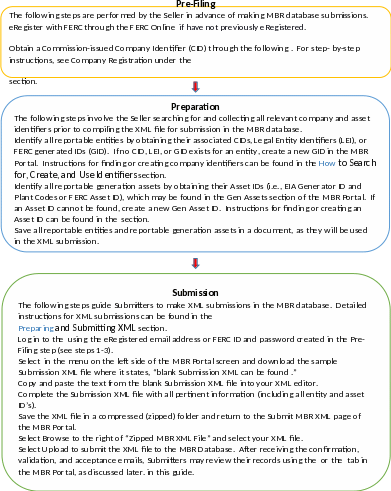
4. Initial Activities: What to Check/Do Before Making Submissions
Submitters will make submissions to the MBR Database through the MBR Portal12 by submitting files in XML format. Within the MBR Portal, Submitters will find tools to research information needed to prepare their XML files for submission, services to extract information from the database, and the link to submit their finalized XML file.
All Sellers are required to have a Commission-issued CID, which can be obtained through FERC’s Company Registration. When completing the Company Registration form, Sellers must check “MBR” as a form and designate agents to file the MBR form, which is required to make MBR database submissions. For additional information on Company Registration, please review the Company Registration instructions.
Submitters Must Be eRegistered to Make Submissions
Submitters must be eRegistered with the Commission to use certain features within the MBR Portal, such as Create GID and Create Asset ID. In order to make submissions into the MBR Database on behalf of a Seller, that Seller must designate an eRegistered user as an account manager or agent (with permission to submit the MBR form) through Company Registration. Please follow the eRegistration link to eRegister with the Commission.
All Companies and People Included in the Submission Need Unique Identifiers
Submitters will often need to identify other companies or people (collectively, reportable entities) in their submissions into the MBR Database. In the MBR Database, reportable entities are identified using CIDs, LEIs, or GIDs. Submitters may search the MBR Portal to find whether a reportable entity already has a CID, LEI, or GID. More information on these identifiers can be found below in the Identifiers section.
Sellers are required to identify any Commission-jurisdictional generation assets that they, or their non-MBR affiliates, own, operate, or control (reportable assets). If a reportable asset is included in the Energy Information Administration (EIA) Form 860 generator tables (EIA Tables), Submitters will be able to find the EIA-860 codes (EIA Codes) for that reportable asset. For reportable assets that do not have EIA Codes, Submitters must request a Commission-generated ID (Asset ID) for that reportable asset. In addition, Submitters may search the MBR Portal to discover if a reportable asset has an EIA Code or an Asset ID. More information on generation assets can be found below in the Generation Assets section.
Making the MBR Database Submission
Once the previous steps have been completed, Submitters will submit an XML file to the database. Submitters must be designated as Account Managers or Agents for any company for which they seek to make XML submissions. Submitters will submit the XML file through the MBR Portal, as described in greater detail below.
All submissions to, and extractions from, the database are done via the MBR Portal. Submitters will also use the MBR Portal to search the MBR Database for information to aid in their submissions or research. Below is a description of the process used to access and utilize the MBR Portal.
Go to the following URL to access the MBR Portal: http://mbrweb.ferc.gov/.
The log-in screen displays:
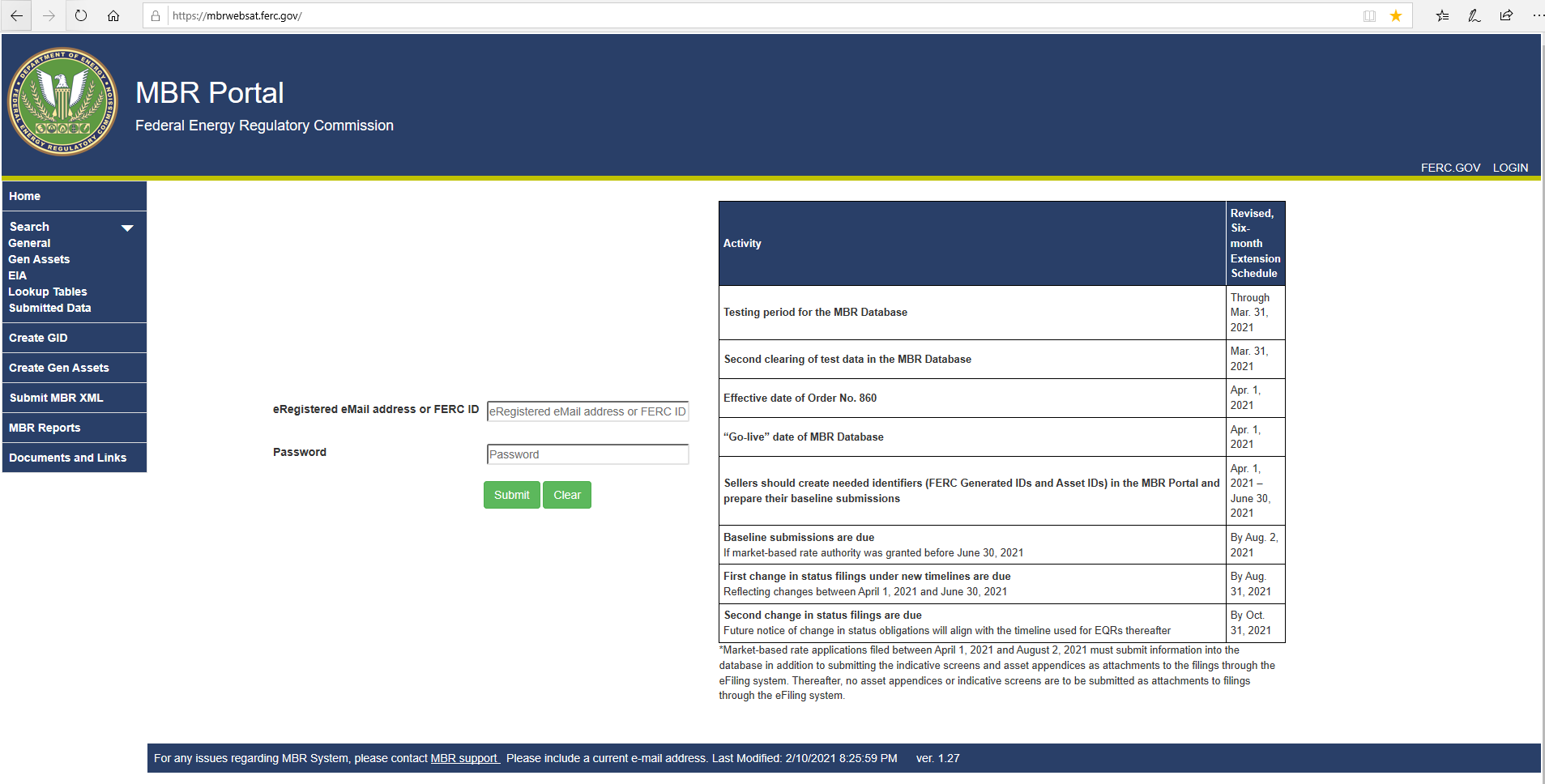
(Figure 1 – Log-In MBR Portal)
Enter the eRegistered email Address or FERC ID and password in the fields.
Click the submit button.
The MBR Portal then displays the Welcome screen, shown in Figure 2:

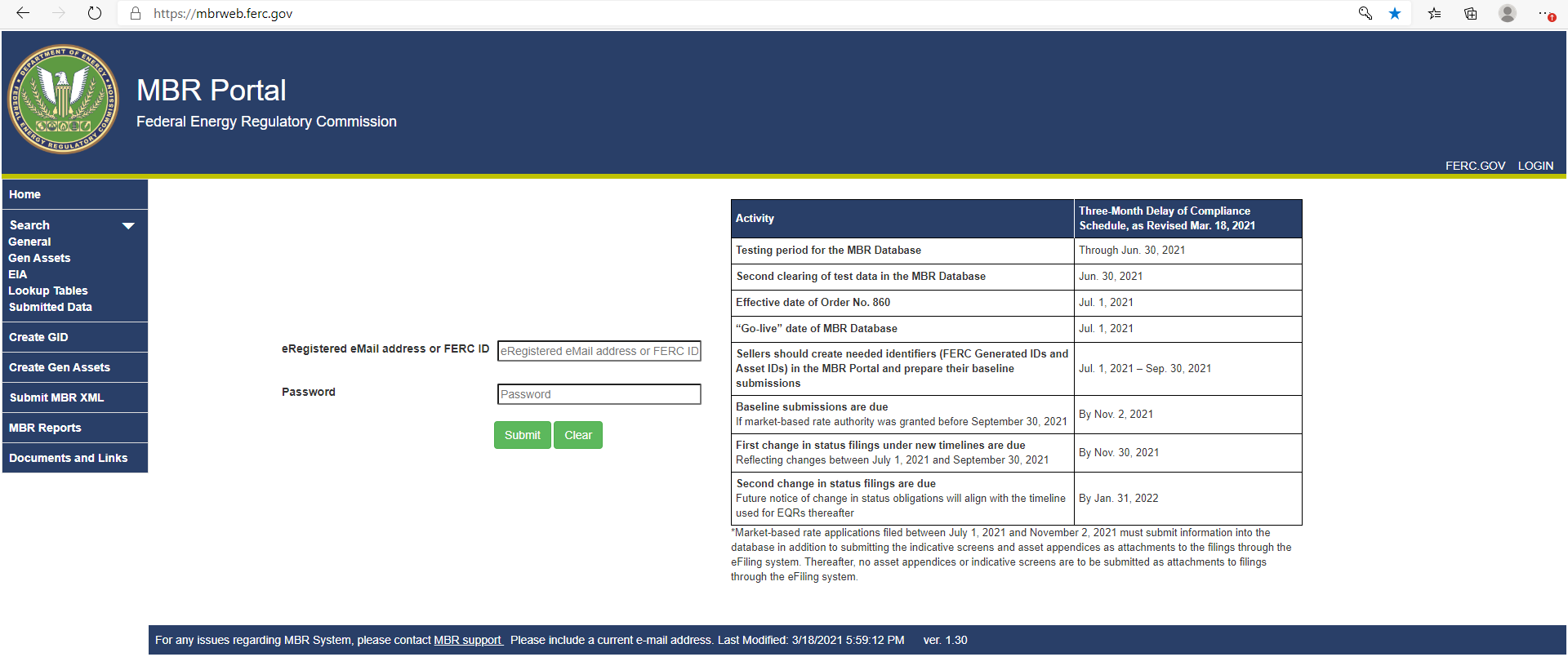
(Figure 2 – Welcome Screen)
The MBR Portal contains several functions navigable in the left side panel (outlined in red in Figure 2) of the Portal, as described more below:
Home: Select to return to the Welcome Screen.
Search: Expand drop-down list to find the search categories below:
General: Searches for the main identifiers (CID, LEI, GID);
Gen Assets: Searches for FERC Asset IDs (generators not found in EIA Tables);
EIA: Searches for EIA Codes and reportable EIA asset data;
Lookup Tables: Searches for numerical or character values for various attributes in the Tables.
Create GID: Create a GID for any reportable entity
Create Gen Assets: Create a reportable asset has no EIA Code or Asset ID
Submit MBR XML: Make the XML file submission
MBR Reports: Find Reports and Additional Data on MBR submissions
Documents and Links: Find collection of relevant documents and links
Before making an XML submission to the MBR Database, Submitters should search the MBR Portal to determine if any reportable entities that Sellers are required to report already exist in the database (i.e., have a CID, LEI, or GID). Submitters may use the search functions on the MBR Portal to identify such reportable entities and assets by following the steps below:

 Click
on General
to search for CIDs, LEIs and GIDs on the MBR
Portal. The screen displays search fields and the first page of
existing database records.
Click
on General
to search for CIDs, LEIs and GIDs on the MBR
Portal. The screen displays search fields and the first page of
existing database records.
(Figure 3 – General Search Page)
To search the database, enter a CID, LEI, GID, or Name into the respective search field. Please note that these fields accept partial entries and will produce results even when complete information is not presented. For example, entering “360” into the Name field would return the companies “360Recycling” and “Recycling360”, if those companies exist in the database, along with any other relevant results.

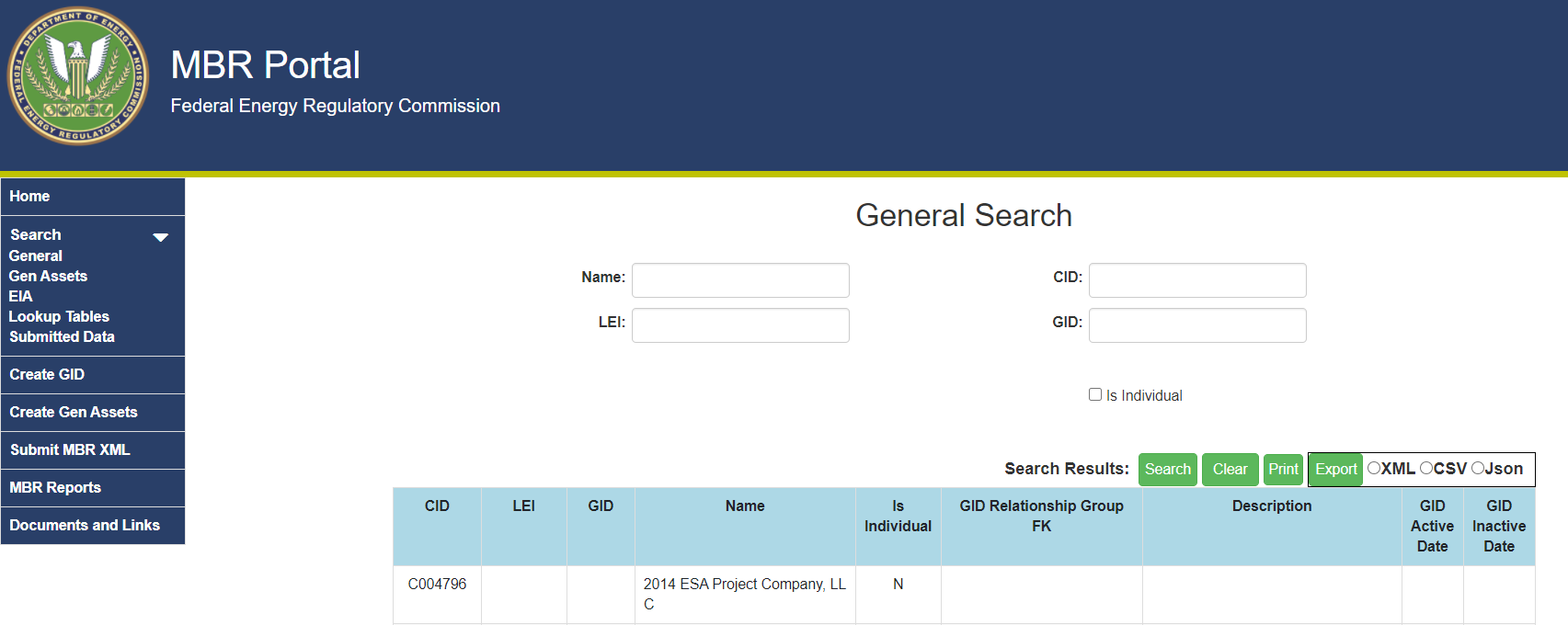 Click
the search button.
Click
the search button.
(Figure 4 – Search button)

Use the buttons at the bottom of the screen to scroll through search results. If desired, click the Print button to print the results or the Export button to export the results to an XML file, as shown in Figures 5 and 6 respectively.

(Figure 5 – Print Button)


(Figure 6 – Export Button)
Submitters should also search the MBR Portal to determine if any reportable assets that Sellers are required to report already exist in the database (i.e., FERC Asset IDs or EIA Codes). Submitters may use the search functions on the MBR Portal to identify such reportable entities and assets by following the steps below:
Click on EIA to search for EIA Codes on the MBR Portal. The screen displays search fields and the first page of existing database records.

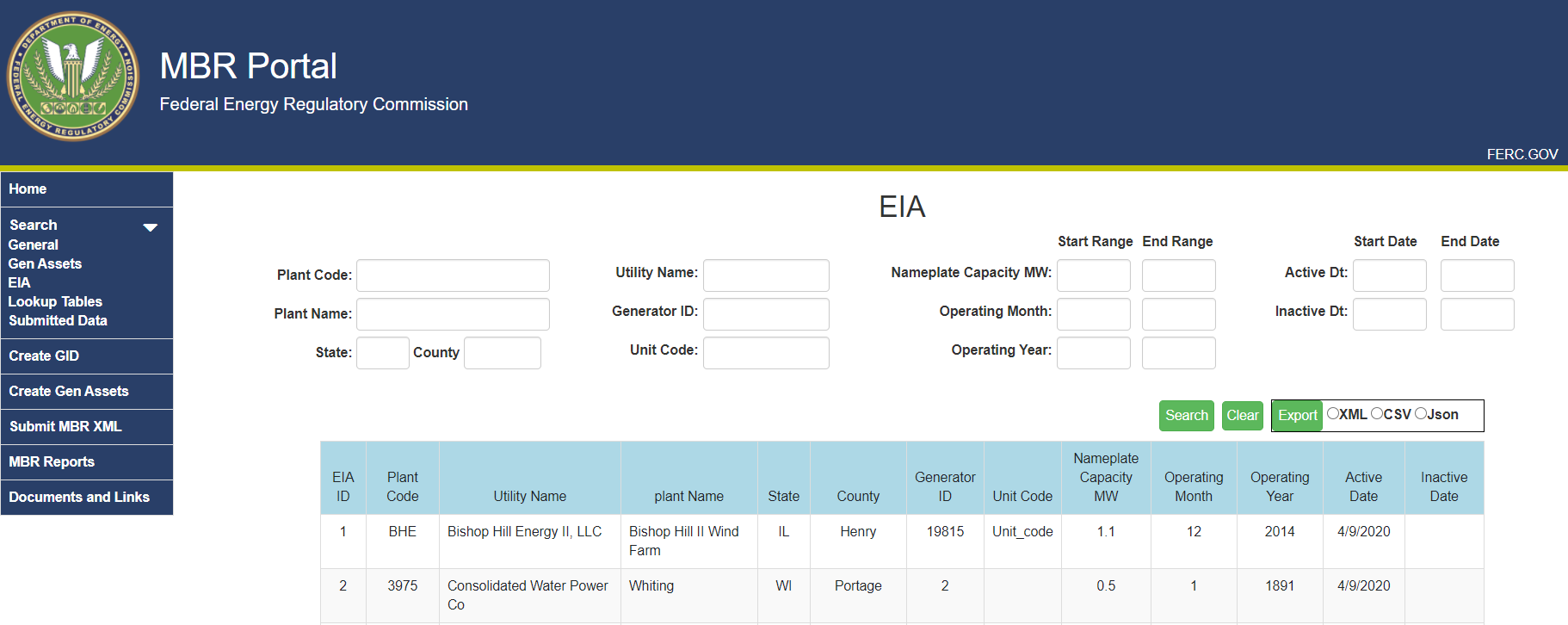
(Figure 7 – EIA Search Page)
To search the database, enter a Plant Code, Generator ID, Unit Code, Plant Name or Utility Name into the respective search field. Please note that these fields accept partial entries and will produce results even when complete information is not presented.
Click the search button.


(Figure 8 – Search button)
Use the buttons at the bottom of the screen to scroll through search results.
Click on Gen Assets to search for FERC Asset IDs on the MBR Portal. The screen displays search fields and the first page of existing database records.

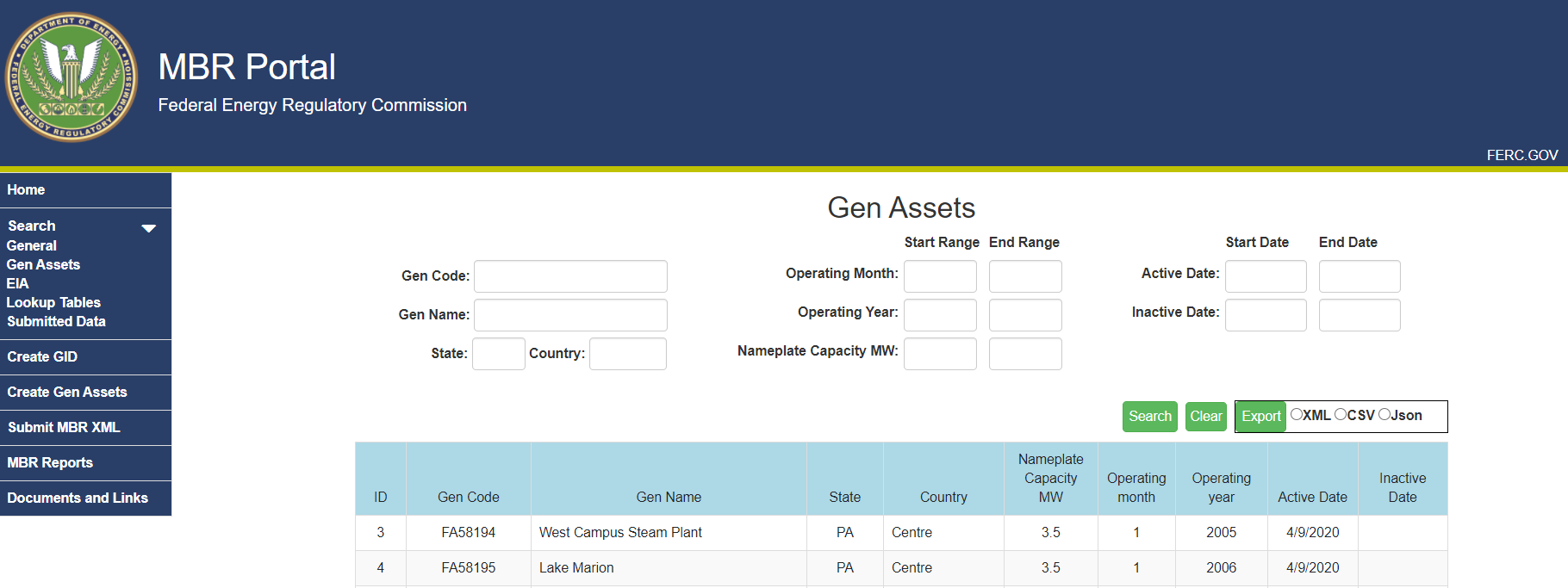
(Figure 9 –Gen Assets Page)
To search the database, enter a Gen Code or Gen Name into the respective search field. Please note that these fields accept partial entries and will produce results even when complete information is not presented.

 Click
the search button.
Click
the search button.

(Figure 10– Search button)
Use the buttons at the bottom of the screen to scroll through search results.
If desired, click the Export button to export the results to an XML file, as shown in Figures 10 and 11, respectively.


(Figure 11 – Export Button)
Following the steps below, Submitters may obtain a GID for any reportable entity that they need to reference in an MBR submission that does not already have a CID, LEI, or GID.
The Create GID page in the MBR Portal allows Submitters the option to either create one GID record at a time, or upload an XML file that contains multiple GID records.

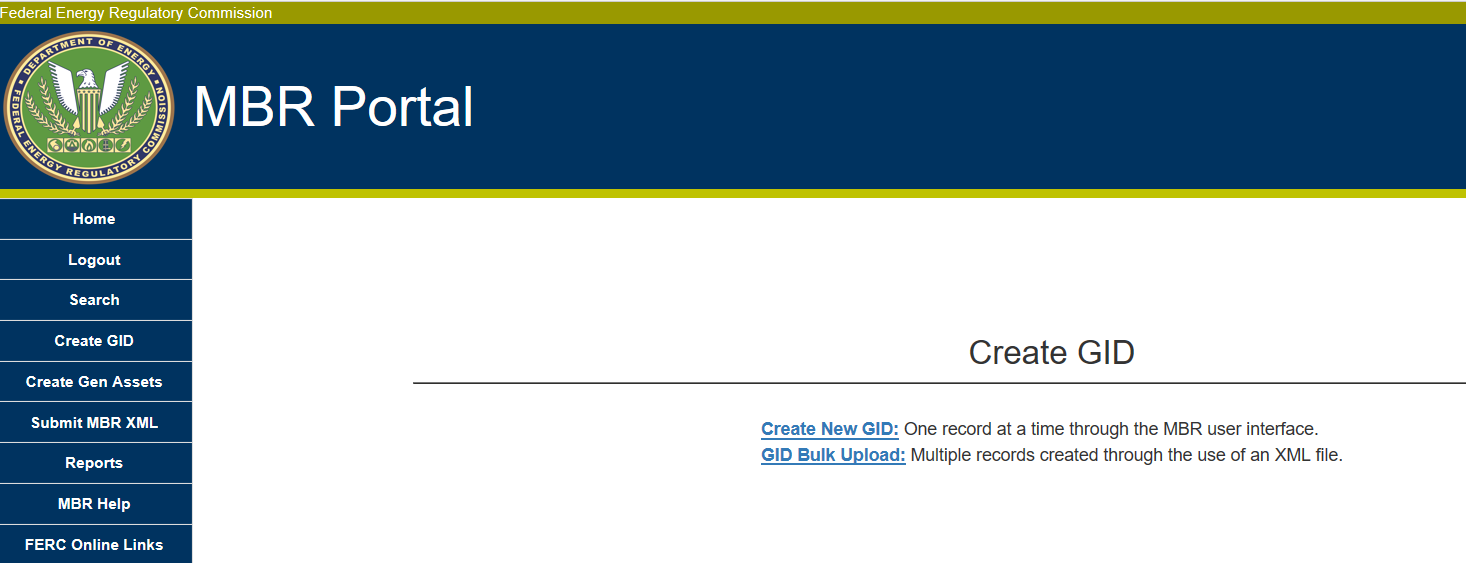
(Figure 12 – Create GID Page)
There are two ways to request new GIDs: individually or through the Bulk Upload. If a Submitter has a large number of reportable entities that it wishes to request GIDs for on behalf of a Seller, the Submitter may use the GID Bulk Upload function.
Click the Create New GID link on the Create GID page, and the Create New GID screen will display:
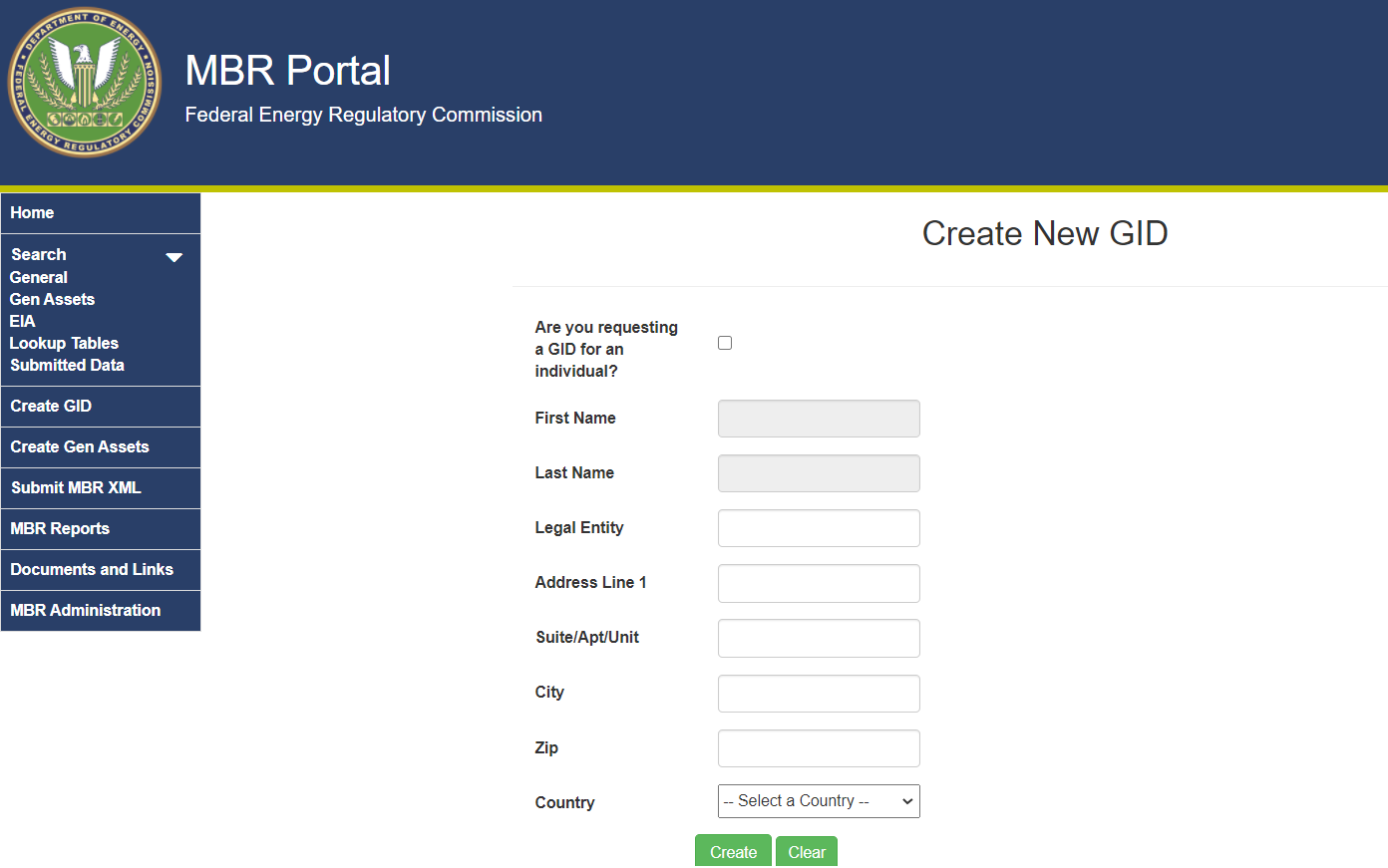
(Figure 13 – Create New GID)
Enter the reportable entity’s legal name in the Legal Entity field (if requesting a GID on behalf of a company) or click the “Are you submitting as an Individual” box (if requesting a GID for a person/individual).
If creating a GID on behalf on an individual, enter that individual’s first and last name. These fields are inaccessible if the “Are you requesting a GID for an individual” box is not checked.
Enter the remaining data in the relevant fields, then click the Create button. If all data was input correctly, a confirmation screen will display the newly created GID.
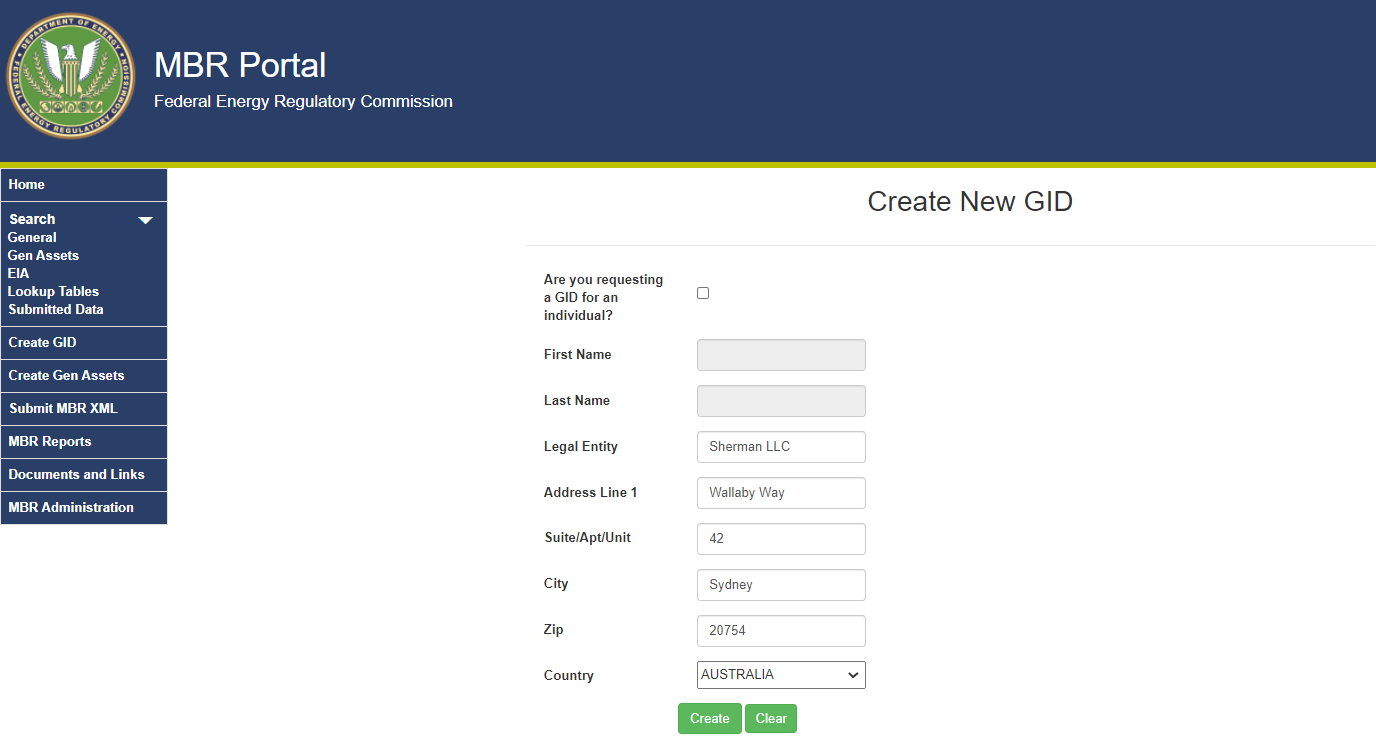
(Figure 14 – Create GID Page)
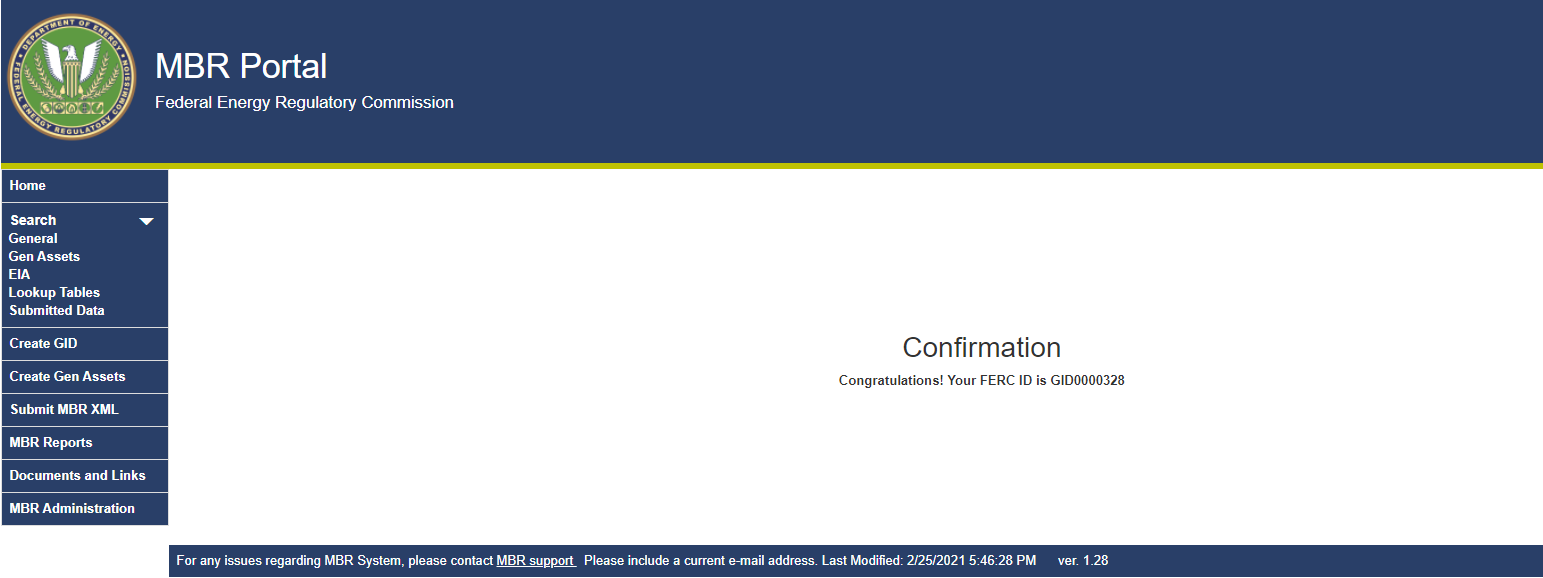
(Figure 15 – Create GID Confirmation)
An email confirming successful GID Registration will be sent to the Submitter’s eRegistered email address.

(Figure 16 – Create GID Confirmation)
The GID Bulk Upload function provides Submitters the ability to register one or many GIDs into the MBR Database through an XML file upload.
The XML file submissions will go through an internal verification process to ensure the data and structure are valid and usable. The schema against which the XML file will be validated can be found here. Processing notifications are sent through email to provide the status of the XML file processing results (i.e., acceptance, rejection, or duplicate record).
In addition, to submit the final bulk upload, an Authentication Key (AuthKey) must be acquired through the interface and entered into the XML file that will be submitted, as detailed below.
The file that a Submitter will upload must contain all relevant data entries, including the AuthKey, and the file must be first saved as an XML file and then saved into a Compressed Zip Folder before upload.
Click the GID Bulk Upload link on the Create GID page.

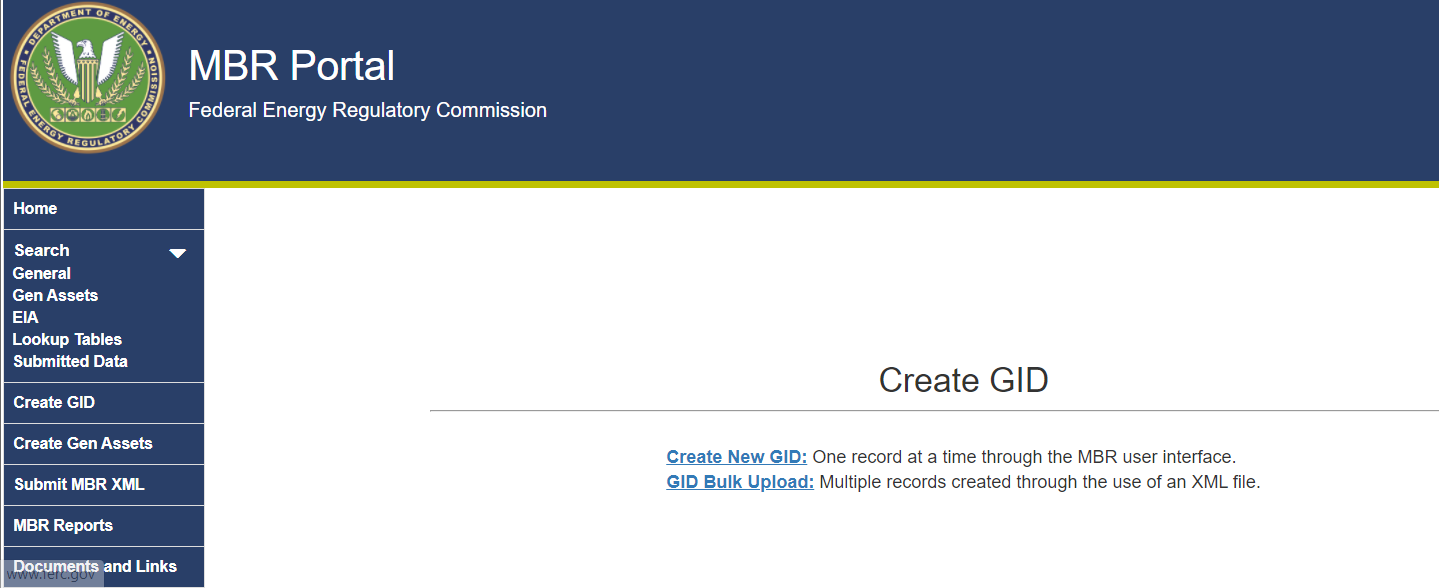
(Figure 17 – GID Bulk Upload Link Location)
The GID Bulk Upload screen has links to the GID XML and GID Schema as well as the link to request an AuthKey and to upload the final GID XML file (please see below for information on requesting an AuthKey).
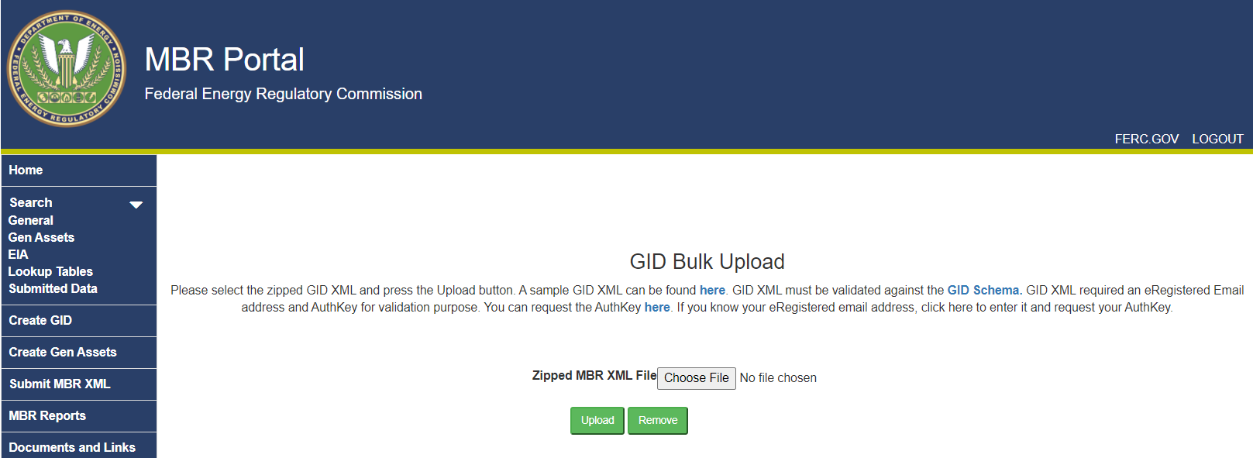
(Figure 18 – GID Bulk Upload screen)
Click this link to view a sample XML file.
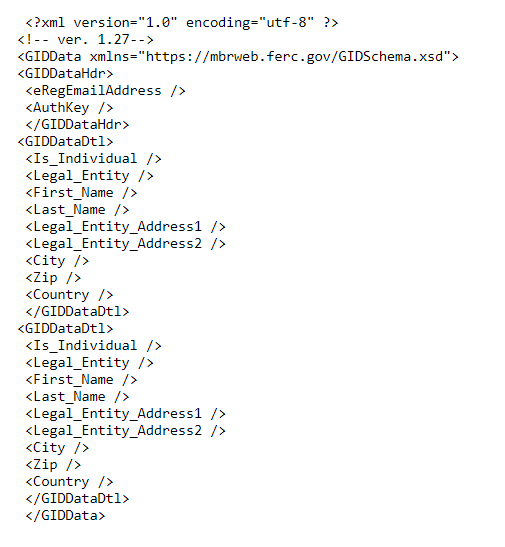
(Figure 19 – Sample XML)
Copy and paste the contents of the Sample XML into a text editor, or any XML editor program.
Edit the file to include the reportable entities’ information in the sample file. To add multiple records, copy and paste the section between the FID Tags <GIDDataDTL> </GIDDataDTL>, and enter relevant info (displayed below in Figure 14). Repeat this step for all reportable entities for which a GID is requested.

(Figure 20 – Tags for data input)
Save the finished file as an XML file and then save it as a Compressed ZIP Folder.
Returning to the GID Bulk Upload screen, click the browse button to locate where the saved Compressed Zip Folder is located.


(Figure 21 – GID Bulk Upload Browse Button)
Select the Compressed Zipped Folder and click the Upload button.
If successful, the Submitter will receive a confirmation message and email.
An email will be sent containing the GID Submission ID, the Seller that submitted it, the date processed, and the GID processing results.
Submitters must have an AuthKey in order to use the GID Bulk Upload function. An AuthKey is an autogenerated code that Submitters must place into their XML, to confirm that they are authorized to make the requested submission. Links to request an AuthKey can be found in the GID Bulk Upload. Submitters do not need to request a unique AuthKey for each submission. Rather, the same AuthKey will work for the GID Bulk Upload and should continue to work for future uploads.
Navigate to the GID Bulk Upload screen.
Click the link shown below to request an AuthKey. An AuthKey is a code that
![]()
(Figure 22 – Link for AuthKey on GID Bulk Upload screen)
Enter a valid email in the eRegistered email address field to receive an AuthKey.
Select submit. An email will be sent with the AuthKey to the eRegistered email address.
In order to identify and track the relationships between Sellers and generation assets, Sellers are required to identify reportable assets in an XML submission. Reportable assets included in the EIA-860 generator tables already have EIA Plant Codes and EIA Generator IDs. Reportable assets that do not have EIA Plant Codes and EIA Generator IDs will be identified using Asset IDs. Submitters may search the MBR Portal to determine if a reportable generator already has an EIA Code or Asset ID. For reportable assets that do not have an EIA Code or an Asset ID, Submitters must request an Asset ID in the MBR Portal following the steps below.
Submitters may obtain an Asset ID for any reportable asset that they need to reference in an MBR submission that does not have an EIA Code or an existing Asset ID.
The Create Gen Assets in the MBR Portal allows Submitters to create one record at a time or upload an XML file that contains multiple records (Bulk Upload). If a Submitter has many reportable assets that require Asset IDs, the Submitter should use the Asset ID Bulk Upload function.
Click on the Create New Gen Asset link, as shown in Figure 18 below.

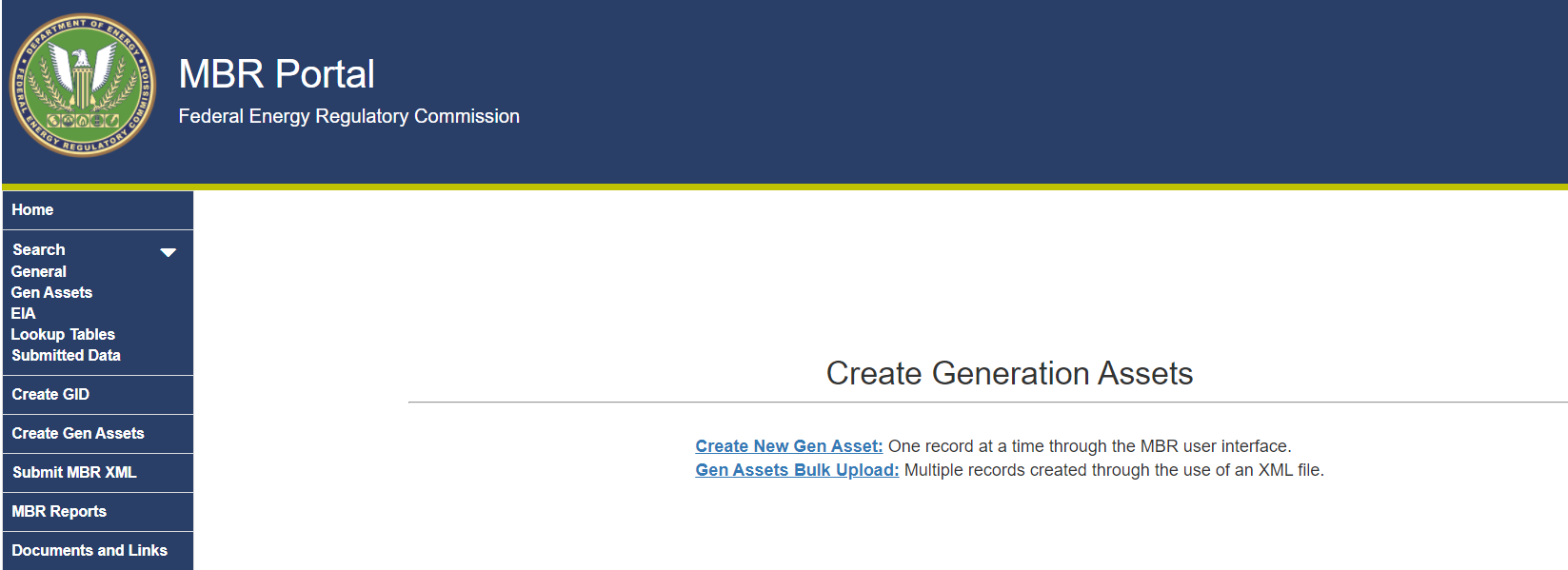 (Figure 23: Create Gen Assets Link)
(Figure 23: Create Gen Assets Link)


(Figure 24: Generation Assets Screen)
Enter the reportable asset’s information in the applicable fields, as shown in Figure 25.
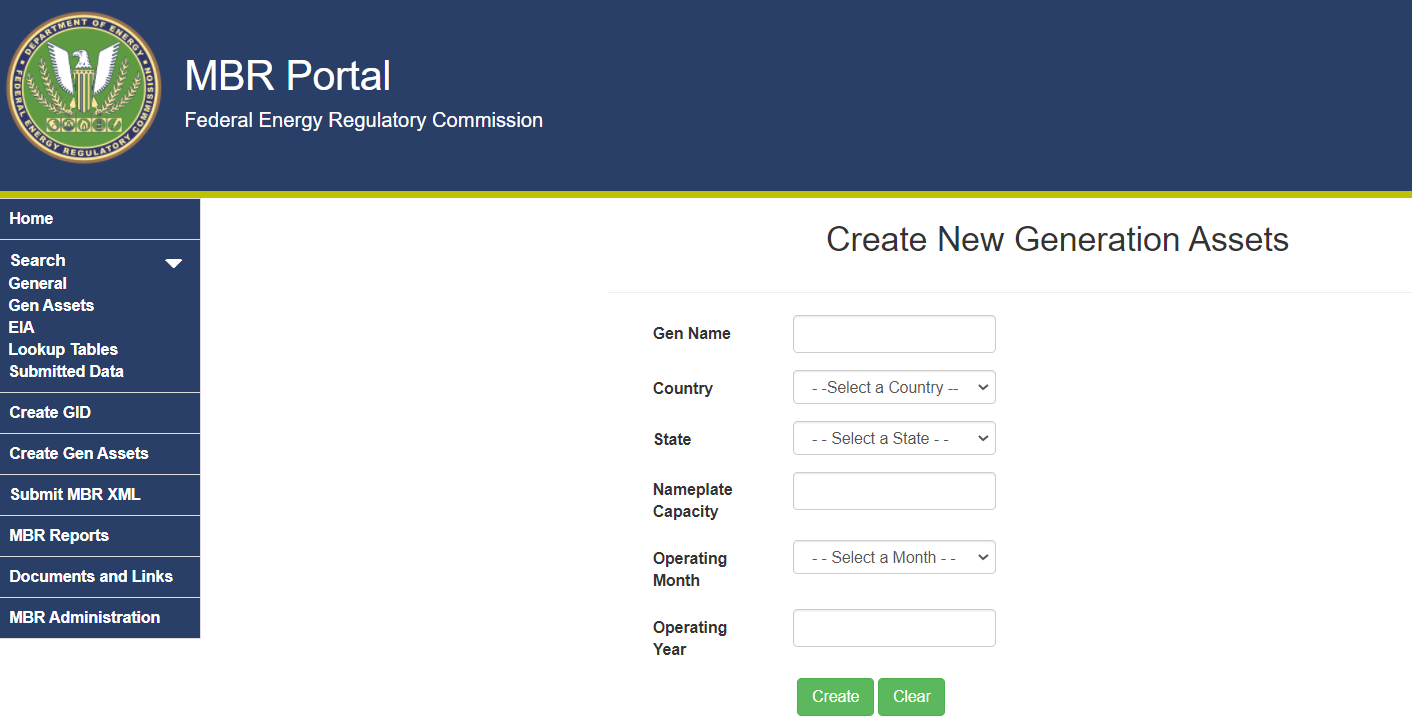
(Figure 25 – Input Generation Asset Information)
Select the Create button to finish.
If all data was input correctly, a confirmation screen will display the new Asset ID.
An email confirming successful Asset ID registration will be sent to the Submitter’s eRegistered email address.
The Asset ID Bulk Upload function allows Submitters to register one or multiple Asset IDs into the MBR Database through an XML file upload.
The XML file submissions will be verified internally to ensure the data and XML structure are valid. The schema against which the XML file will be validated can be found here. Processing notifications are sent through email to provide the status of the XML file processing results (i.e., acceptance, rejection, or duplicate record).
The file that a Submitter will upload must contain all relevant data entries and the file must be first saved as an XML file and then saved into a Compressed Zip Folder before upload.
Click the Gen Assets Bulk Upload link on the Create Gen Assets Page.

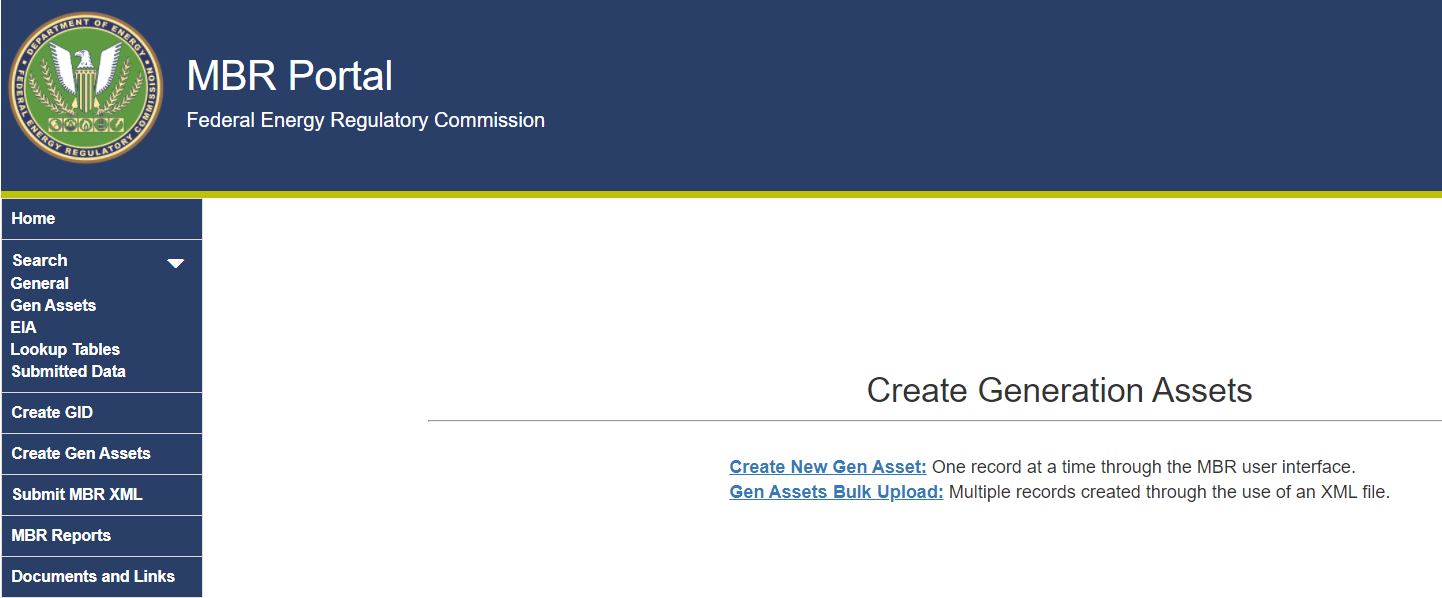
(Figure 26 – Gen Assets Bulk Upload Link)
The Gen Assets Bulk Upload Screen is where Submitters upload zipped XML file. A Sample XML file is provided, as well as the Gen Asset Schema.
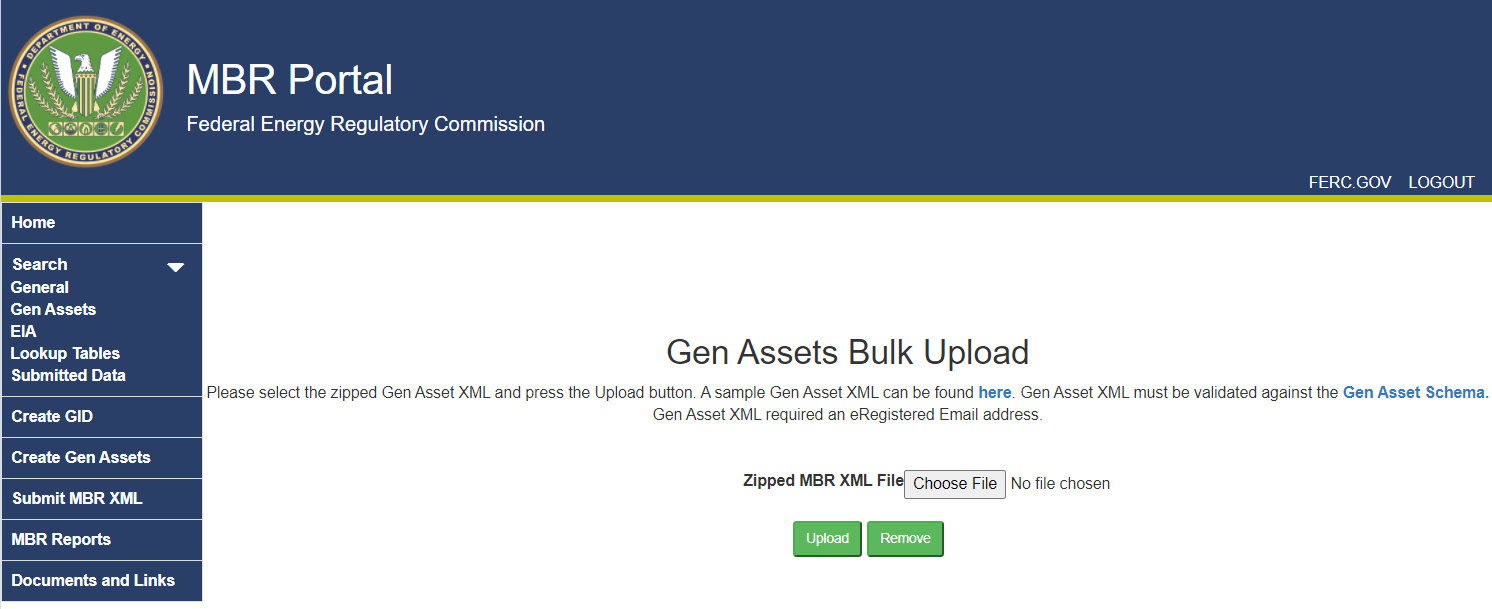
(Figure 27 - Gen Assets Bulk Upload Screen)
Click the link where the webpage states, “A sample Gen Asset XML can be found here” to view a sample XML file.
Copy and paste the contents of the Sample XML into notepad or an XML editor.
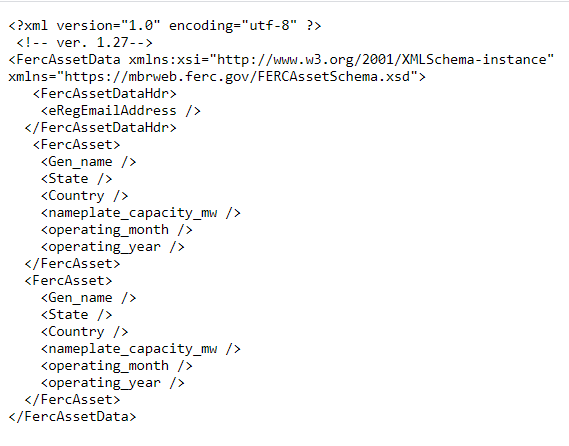
(Figure 28 - Sample Gen Assets Bulk Upload XML)
Edit the sample file to include the reportable entities’ information. To add multiple records, copy and paste the section between the FercAsset Tags <FercAsset> </FercAsset>, and enter the relevant information. Repeat this step for all reportable generation facilities for which a FERC Asset ID is requested.
Save the finished file as an XML file, then save it as a Compressed ZIP folder.
Return to the Gen Assets Bulk Upload screen, then click the Browse button to locate the saved Compressed Zip folder.

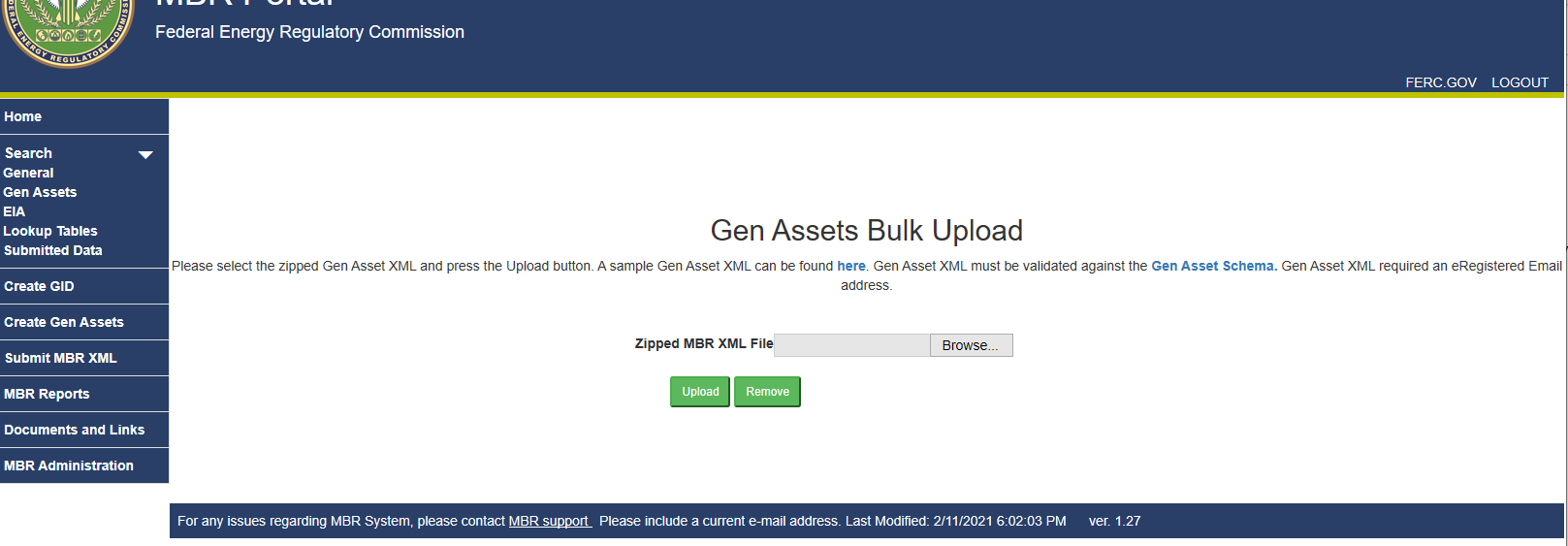 (Figure 29- Gen Assets Bulk Upload Screen)
(Figure 29- Gen Assets Bulk Upload Screen)
Select the Compressed Zip folder and click the Upload button.
If successful, a confirmation message and email are received.
An email will be sent with an Asset ID, who it was submitted by, date processed, and the Asset ID processing results.
Once the Submitter has gathered all of the IDs, it should prepare the MBR XML file for submission.
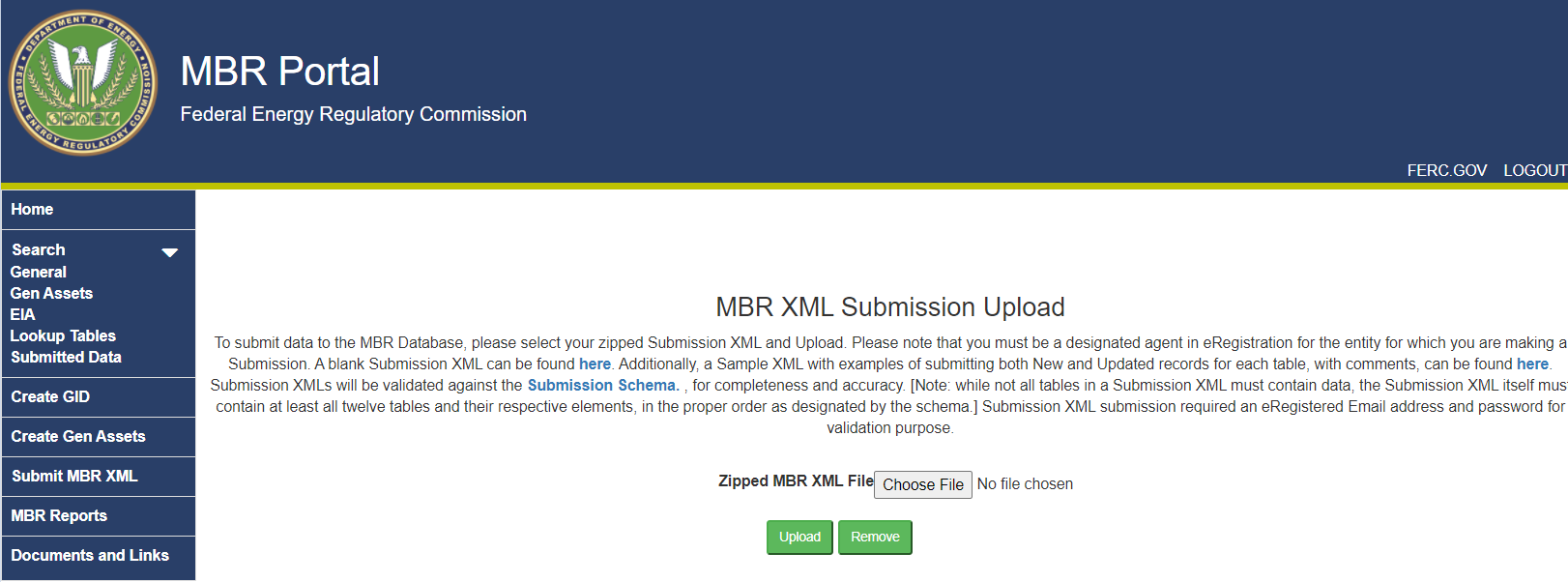
(Figure 30 – MBR XML Submission Screen)
Click the here link to view the blank Submission XML file.
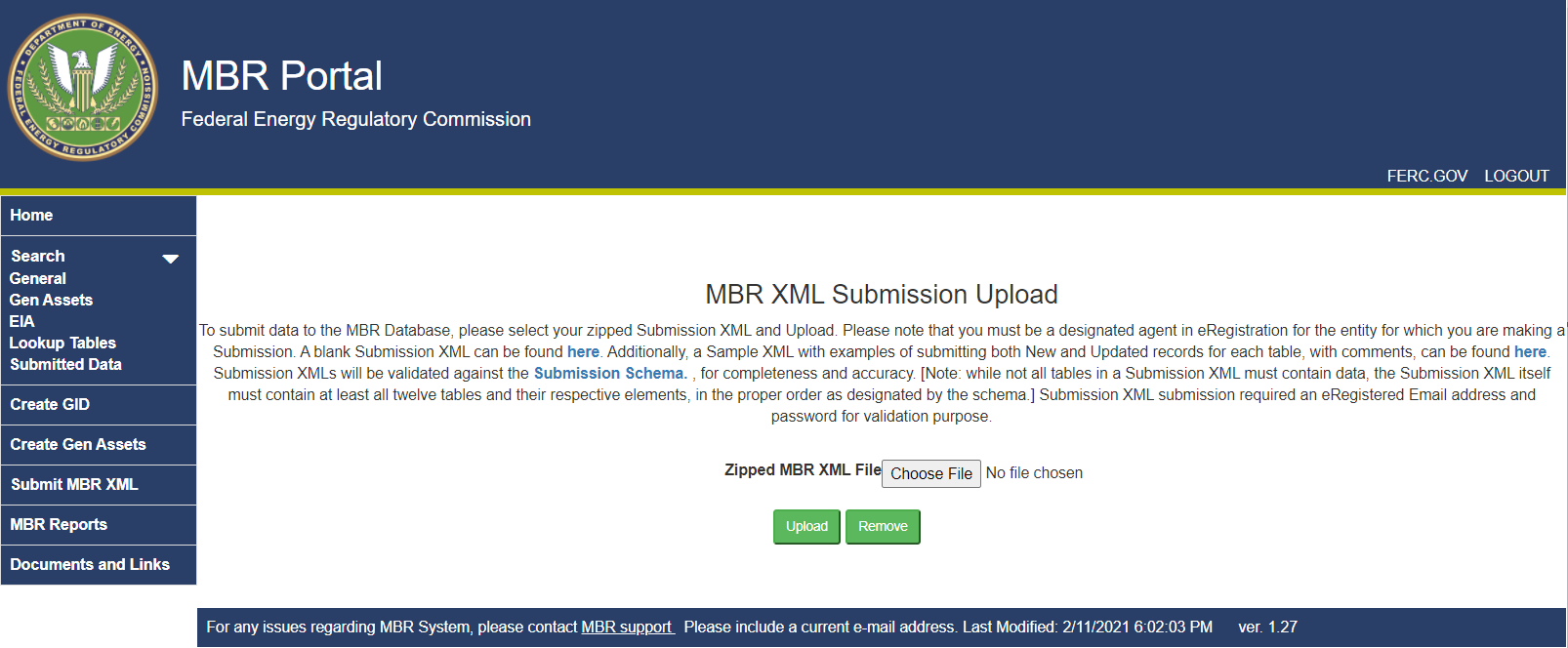
(Figure 31 – MBR Submission Upload Page)
Copy the text of the file into notepad or an XML editor.
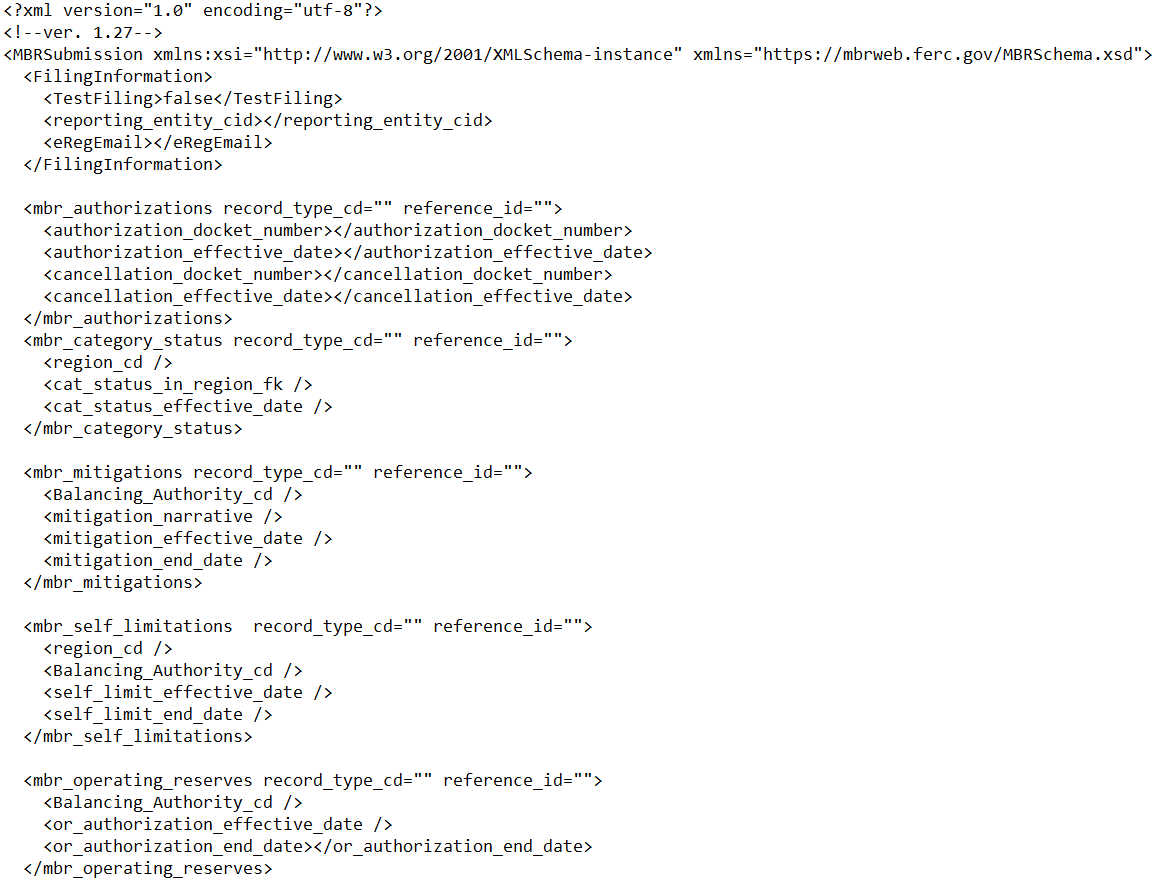
(Figure 32 – Snip of the Blank MBR XML File)
Complete the XML by populating the attributes in each table to be submitted. Use the Lookup Tables in conjunction with the Data Dictionary to populate the correct values for attributes that require identifiers in the XML.
Save the file in XML format and convert it to a Compressed Zip folder.
Click the browse button on the MBR XML submission Upload screen.
Locate the file and click the Open button.
Click the upload button, then view the submission status screen.
If the submission was unsuccessful, there may be an error within the XML, likely in the structure of the XML itself. It is important to note that, while multiples of the same table may be submitted, all 12 tables – even if they are blank – must be submitted in the order of the XML Schema. Please review the XML and correct any errors.
If the submission was successful, the Submitter will receive a message on the MBR Portal noting that the submission was successful.
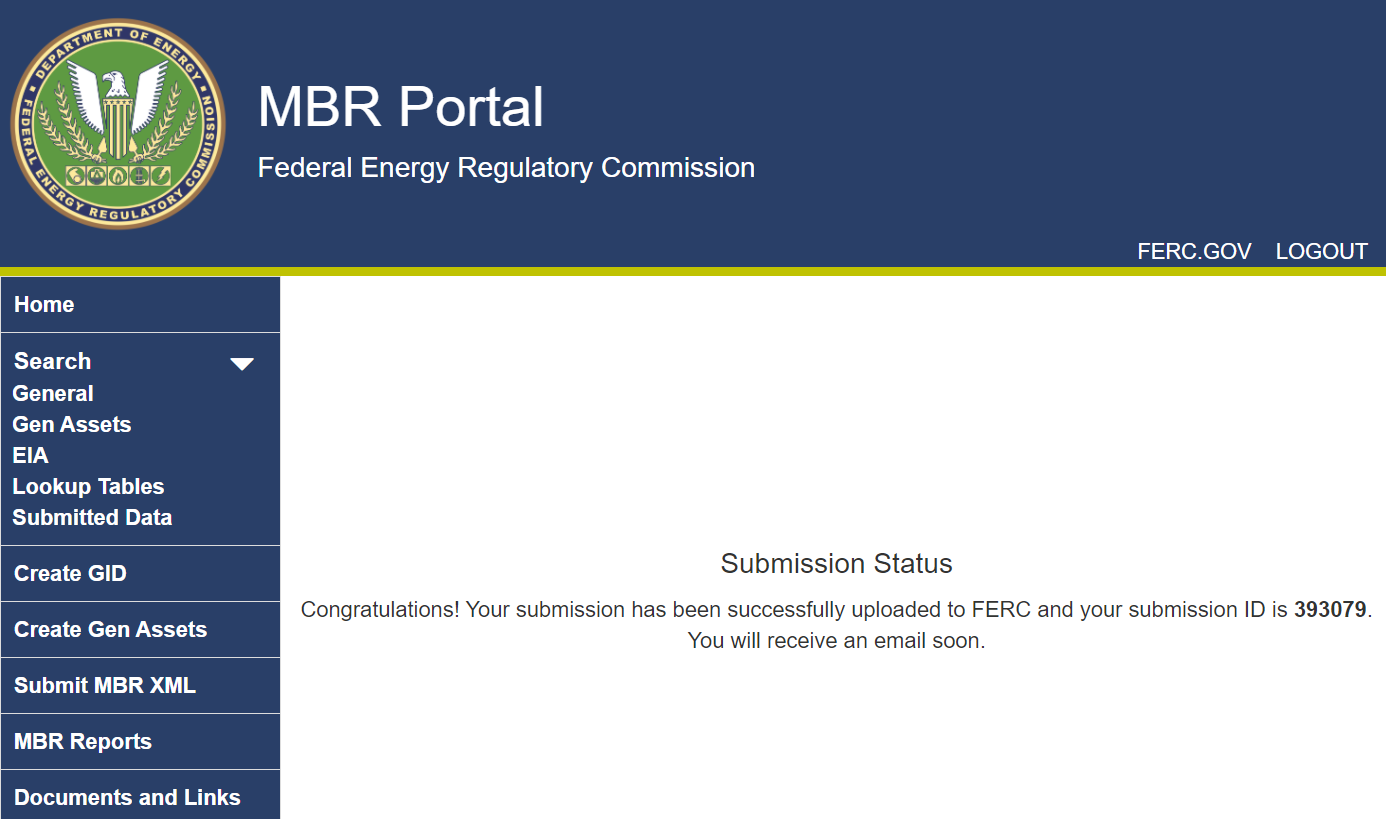
(Figure 34 –Successful Submission Message)
Afterwards, the Submitter will receive a receipt confirmation email. The confirmation email indicates that the submission was received.
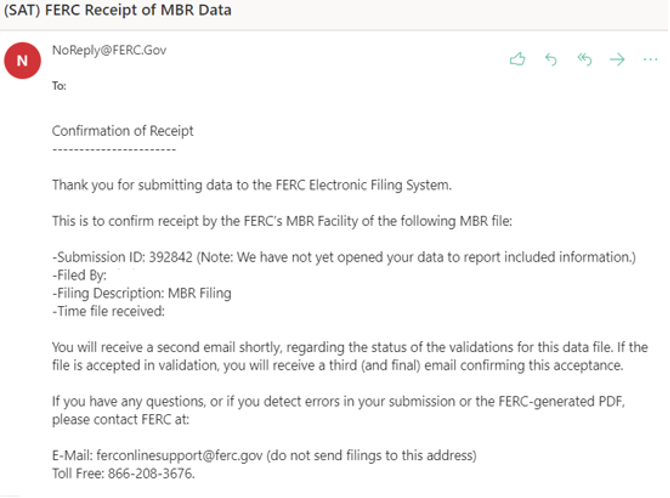
(Figure 35 – Confirmation Email)
Next, the Submitter will receive a validation email. The validation email will indicate whether the XML submission was accepted into the database. Click the MBR Validation Results link.
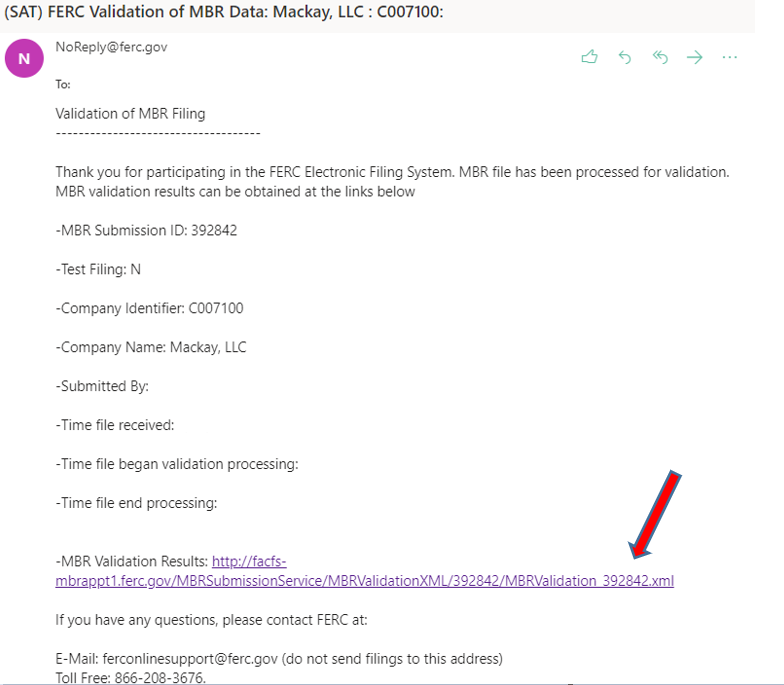
(Figure 36 –Validation Email with Validation Results link)
If the MBRValidationStatus states “FAILED”, the XML submission contained errors and was not accepted into the database. Error messages will point to the places where the submission needs corrections. Edit the submission based the messages and suggestions indicated in the Validation Results and submit the XML again.

(Figure 37 –Failed Validation)
If the MBRValidationStatus states “PASSED”, the XML was accepted and an acceptance email will follow. This email indicates that the data has been successfully included/updated in the MBR Database.

(Figure 38 –Passed Validation)
After receiving an acceptance email, navigate to the Submitted Data Tables to view the submitted data (see Extracting Data section for how to navigate the submitted data tables).

(Figure 39 –Acceptance Email)
After receiving the acceptance email, Submitters may also use the MBR Reports to see a compilation of data views and reports (see Extracting Reports section for how to navigate the submitted data tables). These reports and views are also publicly available to all users of the database.
Extracting Data
Users may extract a variety of data from the database through the Submitted Data and MBR Reports features of the MBR Portal.
Submitted Data Tables
The Submitted Data tables compile all data submitted by Submitters into easily viewable data tables accessible to the public. There are 12 Submitted Data tables based on all the tables in Submitters’ XML submissions, except for the Filing Information table. Through the MBR Portal, users may utilize the various search criteria to view data for Sellers over time.
Category |
Table Name |
Description |
General Information |
FilingInformation |
Basic information about a Seller’s CID and contact information |
mbr_authorizations |
Basic MBR Information |
|
|
mbr_category_status |
Category status in regions where seller has MBR authority |
|
mbr_mitigations |
Markets where seller is mitigated |
|
mbr_self_limitations |
Markets where seller has self-mitigated |
|
mbr_operating_reserves |
Markets authorized to sell operating reserves |
Relationships |
entities_to_entities |
Reporting of ultimate upstream affiliates |
entities_to_genassets |
Reporting of generator assets |
|
entities_to_ppa |
Reporting of power purchase agreements |
|
entities_to_vertical_assets |
Reporting of vertical assets |
|
Market Power Screens |
indicative_pss |
Inputs of Pivotal Supplier Screen |
indicative_mss |
Inputs of Market Share Screen |
Table Name |
Description |
FilingInformation |
Basic information about a Seller’s CID and contact information |
mbr_authorizations |
Basic MBR information of sellers |
mbr_category_status |
Category status of sellers in all six regions |
mbr_mitigations |
Markets in which sellers are mitigated |
mbr_self_limitations |
Markets in which sellers have self-mitigated |
mbr_operating_reserves |
Markets in which sellers are authorized to sell operating reserves |
entities_to_entities |
Affiliate relationships for all sellers |
entities_to_genassets |
Sellers’ affiliated generator assets |
entities_to_ppa |
Sellers’ power purchase agreements |
entities_to_vertical_assets |
Sellers’ vertical assets |
indicative_pss |
Inputs of Pivotal Supplier Screen |
indicative_mss |
Inputs of Market Share Screen |
MBR Reports
MBR Reports use the Submitted Data tables to transform single tables into more complex data views. The MBR Reports page is broken down between Reports and Additional Data. Additional Data reports also combine multiple submitted data tables in views that are designed to assist Submitters in their XML submissions.
The following table summarizes the main Reports:
Report Name |
Description |
Market Share Screens |
Displays full market share screens and pass/fail status for entity and its affiliates |
Pivotal Suppler Screens |
Displays full pivotal supplier screens and pass/fail status for entity and its affiliates |
Asset Appendices |
Compiles Aggregate Generation Assets, Vertical Assets, and Power Purchase Agreements by Ultimate Upstream Affiliation |
Global Information Sheet |
Compiles entities’ results data from market share and pivotal supplier screens for markets within a certain geographic region |
Company Dashboard |
Provides entities’ UUAs, MBR Authorization Docket Nos., any mitigations, and Category Status Active Dates |
Asset Appendix |
Lists entity and its affiliates’ generation facilities, transmission facilities, long-term PPAs, and inputs to electric power production |
The following table summarizes the Additional Data reports:
Report Name |
Description |
Submission Summary |
The Submission Status and whom filed MBR submissions |
FERC Asset Submission Summary |
Displays FERC Asset bulk submission data |
FERC Asset Single Submission Summary |
Displays FERC Asset single submission data |
MBR Affiliations List |
Displays a list of all affiliations reported in the MBR Database |
Market Share Screen Details |
Displays submitted data in a viewable market share screen. |
Pivotal Supplier Screen Details |
Displays submitted data in a viewable pivotal supplier screen. |
Exporting Data
Each Search, Lookup table, Submitted Data table, and Reports on the MBR Portal allow users to export data in XML, comma-separated values (CSV), or JavaScript Object Notation (Json) formats.
To export such data from the above-noted tables, users should navigate to the Submitted Data tables they seek to export data from and follow the steps below:
Use the Filter in Figure 40 to narrow down results, then select the data format and click export. Figure 40 displays the filtering options for the MBR Authorization table. Other Submitted Data tables offer similar filtering options.


(Figure 40 – MBR Authorization Filter and Export)
If seeking to export an entire page of data, leave the filter fields blank, choose a file export format option, then click export:

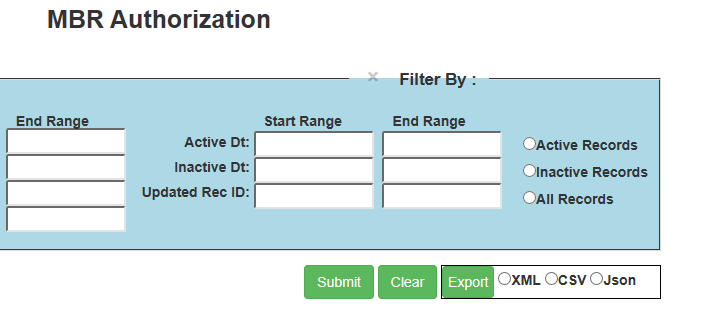
(Figure 41 – MBR Authorization Export)
Users seeking to develop their own software, or use software that was developed by vendors, may link their software to the MBR Portal. There are two ways to interact with the MBR Portal: (1) by downloading or extracting data; and (2) by submitting data.
To download data, the MBR Portal employs an Application Programming Interface (API) known as the MBR Web API. To submit data, the MBR Portal uses the Windows Communication Foundation (WCF) known as the MBR WCF Service. For additional information on the MBR Web API and MBR WCF Service components of the MBR Portal, follow the steps below:
Navigate to the log-in screen and select the Documents and Links tab:


(Figure 42 – Documents and Links Tab)
In the Documents and Links tab, under the Links select either the MBR Web API link or the MBR WCF Service links.


(Figure 43 – API and WCF Links)
The MBR Web API Service link goes to: https://mbrwebapi.ferc.gov/Help, which contains method links for each Lookup and Submitted Data table. Select the method links for the request and response information for each web API method.
The MBR WCF Service link goes to: https://mbrsubmission.ferc.gov/MBRSubmissionService.svc, which allows users to invoke the MBR WCF Service and submit data to the MBR Portal from a client application.
This information collection is mandatory as required by 18 CFR Part 35.
There are approximately 2,647 Sellers that will submit information into the relational database. Six institutional investors currently have section 203(a)(2) blanket authorizations, which collectively own approximately 110 upstream affiliates that themselves own Sellers. In the August 19, 2021 order revising the information collection, the Commission estimated an average of four Sellers affected for every upstream affiliate, equaling 440 total sellers. The estimated burden and cost for the requirements in this order are as follows. Information on estimated burden from Order No. 860 is displayed for background only.
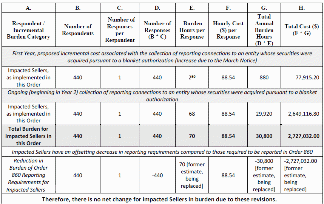
Burden
estimate table:
Additional information can be found at the Information Collections Page on ferc.gov.
The requirements of the information collections in Order 860 and the August 19, 2021 order are covered by FERC-919A (OMB control number 1902-0317).
The Office of Management and Budget Expiration Date is [TBD]. An agency may not conduct or sponsor, and a person is not required to respond to, a collection of information unless it displays a currently valid OMB control number (5 CFR 1320.8(b)(b)(vi)).
1 The MBR Database was established by the Commission in Order No. 860. Data Collection for Analytics & Surveillance and Market-Based Rate Purposes, Order No. 860, 168 FERC ¶ 61,039 (2019), order on reh’g, Order No. 860-A, 170 FERC ¶ 61,129 (2020). On August 18, 2021, the Commission issued an Adopted Revision of Information Collection, adding three new data fields to the entities_to_entities table. Adopted revisions to information collection, 176 FERC ¶ 61,109.
2 A Seller is defined as any person that has authorization to or seeks authorization to engage in sales for resale of electric energy, capacity or ancillary services at market-based rates under section 205 of the Federal Power Act. See 18 C.F.R. § 35.36(a)(1) (2020); 16 U.S.C. § 824d.
3 Also known as XML “Sheets.”
4 The MBR Portal is available at: https://mbrweb.ferc.gov/. We provide links to specific sections of the MBR Portal throughout this guide as necessary.
5 For purposes of this user guide, Submitters are defined as any person or entity inserting or uploading data into the database. This includes Sellers and any person or entity authorized to submit on behalf of Sellers.
6 Note that not all submissions into the database require a subsequent filing to the Commission. For example, if a new affiliation with a generator of an already affiliated entity increases controlled capacity in a market by 75 megawatts, the database should reflect this increase, but it would not create a change in status filing obligation. Likewise, cumulative changes should also be considered. For instance, if controlled capacity increases by 500 MW but subsequently decreases by 450 MW within the same quarter, there would also be no obligation to submit a change in status filing because the net increase in generation is below the 100 MW threshold.
7 Submissions including any of the “Relationships” information on page 3, allow the system to auto-generate both a Seller’s asset appendix as well as the necessary reports for any submitted market power screens.
8 Order No. 860, 168 FERC ¶ 61,039 at P 185.
9 Order No. 860, 168 FERC ¶ 61,039 at P 171.
10 Although Sellers are required to submit their information into the database it will not be used to process their filings. As noted above, the asset appendices and indicative screens are required to be submitted as attachments with their initial applications during this time period. Sellers are required to submit this information by November 2, 2021 so that their affiliates’ asset appendices will be correct and complete.
11 Order No. 860, 168 FERC ¶ 61,039 at P 314.
12 The MBR Portal is described in the next section, 5. Description of the MBR Portal.
| File Type | application/vnd.openxmlformats-officedocument.wordprocessingml.document |
| File Title | FERC Issuance |
| Author | Byron Corum |
| File Modified | 0000-00-00 |
| File Created | 2021-10-25 |
© 2026 OMB.report | Privacy Policy
